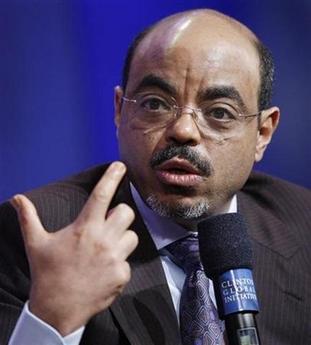Meles Zenawi: two-sided man who took the Long March to power – By Richard Dowden

Earlier this year I wrote that “˜Meles Zenawi is the cleverest and most engaging Prime Minister in Africa’ but I always felt that when I talked to Ethiopians about him it seemed like I was speaking about a different person. It was as if he had two personalities – one for Ethiopians, the other for Farangis – as westerners are called in Ethiopia. The Ethiopians saw a dour dogmatic man who rarely smiled. We saw a shrewd but diffident, laid-back guy who was always ready for a joke.
There is a basic rule in journalism that you must report what you see and hear if it is important. To leave something important out is as bad as inventing a fact or story. The only occasion on which you may leave something is if you are morally certain that someone will die as a result. I have rarely had to do this. But one occasion was during peace talks in 1999 over the war between Eritrea and Ethiopia. I flew to Asmara and got to see Issias Afkwerke, the Eritrean President. He showed me the GTZ map which had been drawn up by a German NGO wrongly showing a great slice of Eritrea, including the vital town of Badme, to be in Ethiopia. “You see”, said Issias, “this is what Zenawi is trying to steal from us.”
I took the map, flew to Sa’ana and then to Addis, managing to get to Meles only two days later. I told him his brother Issias sent his greetings (which was not quite true, but made Meles laugh) then produced the map and asked him, “Is this what you are claiming?”
Meles studied the map and looked grave. Then he said with an innocent smile. “Oh no. We are claiming much more than that!”
I didn’t report that. Afwerke has no sense of humour and the war probably have restarted.
He was not always the hard disciplined Stalinist he is sometimes made out to be, but he did not like his weaknesses to be known. He used to be a chain smoker and during another interview with him I lit a cigarette and left the packet on the table. After a while he paused and then said quietly. “Could I have one please?” As he lit it he said: “Just don’t’ tell the American Ambassador. He’s my tennis partner and I have promised him I have given up smoking.”
The first and second times I met him were in London. He really had done the Long March – fleeing from Addis Ababa University when Mengistu seized power in 1974 and taking to the mountains in his native Tigray to start the revolution. It took them 15 years to make it back to the Ethiopian capital. While he was up in the mountains the revolutionaries moved around cautiously. A (male) journalist colleague found Meles in a Catholic convent hostel up in the mountains but there were no spare rooms and it was too cold to stay outside. Meles promptly let the journalist share the small room with him.
In 1990 the Soviet Union, Mengistu’s main backer, had collapsed and the rebel armies had reached Dessie in Wollo province. It was clear it was only a matter of time before the regime collapsed. When I found Meles I said, “I think I am shaking hands with the next Emperor of Ethiopia”. When I met him again recently, he reminded me. “Do I look like an emperor?”
“No,” I said, “but we are in one of the imperial palaces.”
Richard Dowden is Director of the Royal African Society and author of Africa; altered states, ordinary miracles. For more of Richard’s blogs click here.







[…] it was too cold to stay outside. Meles promptly let the journalist share the small room with him. Â Read more… Share this:ShareTwitterFacebookLike this:LikeBe the first to like this. This entry was posted in […]
What i read here about the late PM of Ethiopia,meles zenawi was very interesting. I just joined your Chanel so that i would get an access to read more about African politics and the world’s current status at large. Thanks!